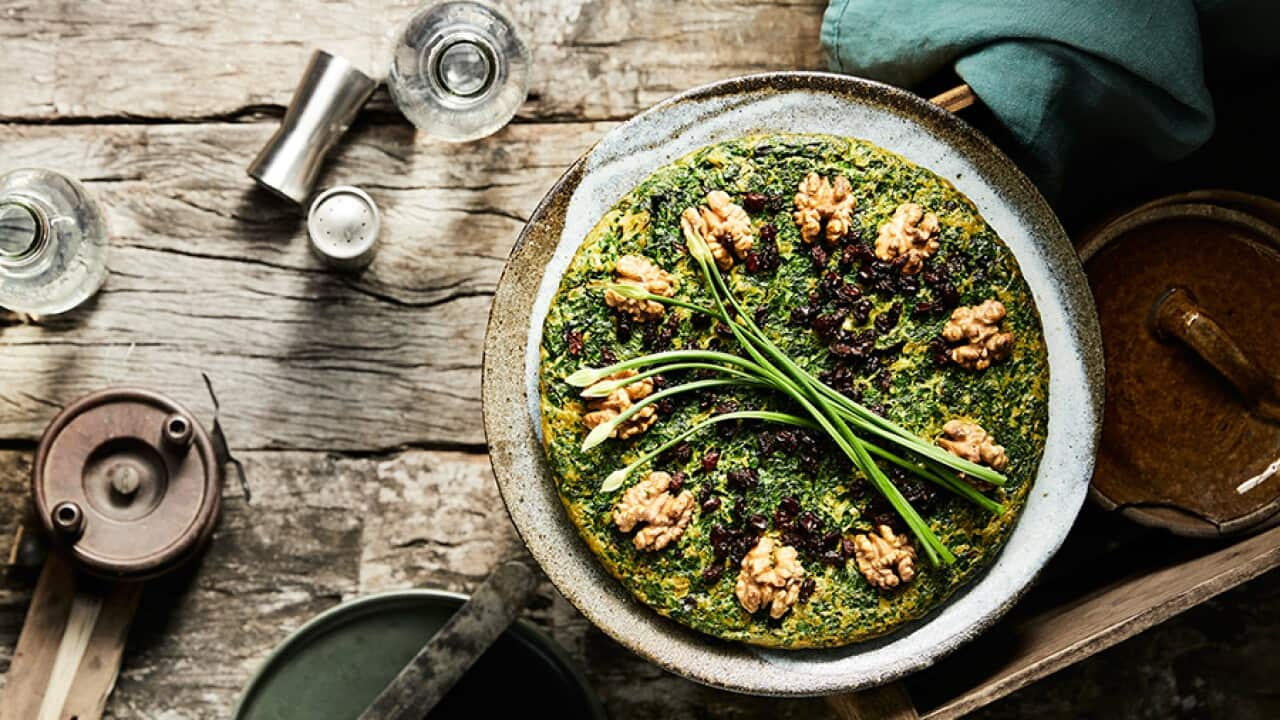In India, a dosa is the best 'utensil' to pick up rich sauces and curries. In Ethiopia, a spongy flatbread called injera is used to scoop up food and even shared among other diners known as gursha. Around the world, many communities enjoy cuisines without cutlery.
According to Ayurveda, fingertips are believed to boost digestion and therefore eating with your hands have proven to provide health benefits like reducing chances of diabetes and even promoting weight loss since you eat more slowly and allow the taste, texture and aromas of your food to engage all your senses.
In Iran, a popular kebab called koobideh is relished on the streets and eaten during family gatherings — the dish is of course, best eaten with your hands. However, to Hamed Allahyari, a Persian cook and owner of Cafe Sunshine & SalamaTea in Melbourne, sabzi polo ba mahi (herbed rice served with fish) is a dish he fondly remembers eating with his hands when growing up in Iran. Considered one of the most popular dishes to ring in the Persian New Year, which is on 20 March this year, sabzi polo ba mahi can be found on all Iranian tables without fail.
CELEBRATING PERSIAN NEW YEAR

Persian New Year: sweets, sprouts and the table of seven
Like many cultures, the Persian New Year has a host of dishes to ring in the new year, including asheh reshteh, a comforting noodle soup that brings success to the person who eats it. However, no New Year celebration is complete without sabzi polo ba mahi. Packed with fresh herbs (sabzi) like dill and coriander, the dish signifies the start of spring, but more importantly symbolises fruitfulness for a well-balanced year ahead.
The grilled fish (mahi) which is served with rice (polo) completes the dish. Each element comes together to represent good luck and fortune.
"The best way to make this dish is the traditional way," says Hamed. But in addition to aromatic herbs like chives and dill, as well as saffron, Hamed also adds garlic, which he makes into a paste and adds to the rice. This is encouraged in North and South Iran but not the rest of the country.
Served as a main dish, sabzi polo ba mahi is served with other New Year dishes like kuku sabzi, Persian herbed frittatas with walnuts and blueberries, as well as old Persian garlic pickles which have been aged for at least two years.
Spritzed with orange juice upon serving, the dish has sour yet sweet notes which break away from being another 'boring plain rice dish' as Hamed says. "The way we cook the rice is totally different, we make a crispy bread bottom with the rice which is called tahdig and my kids love it," the father of two says.
TRY THIS AT HOME

Crispy-bottomed Persian rice
Hamed remembers making this dish with his mother and family who are all still in Iran. With all the ingredients easily obtainable in Australia, Hamed's sabzi is now recreated with his kids and served to his guests at his eatery in Sunshine.
"My earliest food memory is eating sabzi polo ba mahi, when I was home in Iran. I remember making it with my mum, marinating the fish and then frying it up," says Hamed.
He continues, "I love cooking and especially feeding people. When I cook for my mum and family, I am happy that they think my food is delicious." While the dish is essential for New Year celebrations, it is the rituals of gathering your family together that Hamed loves the most. "The thing I really love is that all the family members spend time together and enjoy eating together. Because it is a tradition for Persian families, we have it every year and the whole family from grandparents to young kids enjoy it together," says Hamed.
While the dish is essential for New Year celebrations, it is the rituals of gathering your family together that Hamed loves the most. "The thing I really love is that all the family members spend time together and enjoy eating together. Because it is a tradition for Persian families, we have it every year and the whole family from grandparents to young kids enjoy it together," says Hamed.

Hamed Allahyari enjoys eating sabzi polo ba mahi over Persian New Year with his family. Source: Supplied
When I cook, she loves to be involved and she asks me so many questions that remind me of myself when I was young .
Hamed now continues the tradition of making sabzi polo ba mahi with his daughter and son, which brings back memories of cooking with his own mother. "My two kids, [my] daughter Nikan, who is 8 years old, and [my] son Kian, 5 years old, love cooking with me, especially Nikan. When I cook, she loves to be involved and she asks me so many questions that remind me of myself when I was young and learning to cook too. I asked my mum too many questions about her dishes when I was a child," laughs Hamed.
Perhaps the curiosity Hamed had for his mum's cooking has paid off, because of Hamed's commitment to teaching Persian cooking classes, cooking for his kids and running his own Persian eatery, Melburnians have access to authentic, true and honest-to-goodness Persian cuisine.
And what does Hamed's mother think of his sabzi polo ba mahi? "I think she is proud of what I'm doing because bringing Persian food to Australian tables and making them fulfilled and satisfied with our recipes is not an easy job.
"I'm working hard to show Persian food to everyone in this world and my mum is very happy to see the way I am doing it. My dream is that every person in this world will try Persian food at least once in their life. What better way than to start with sabzi polo ba mahi?"









